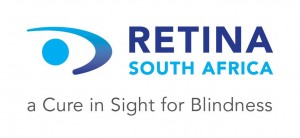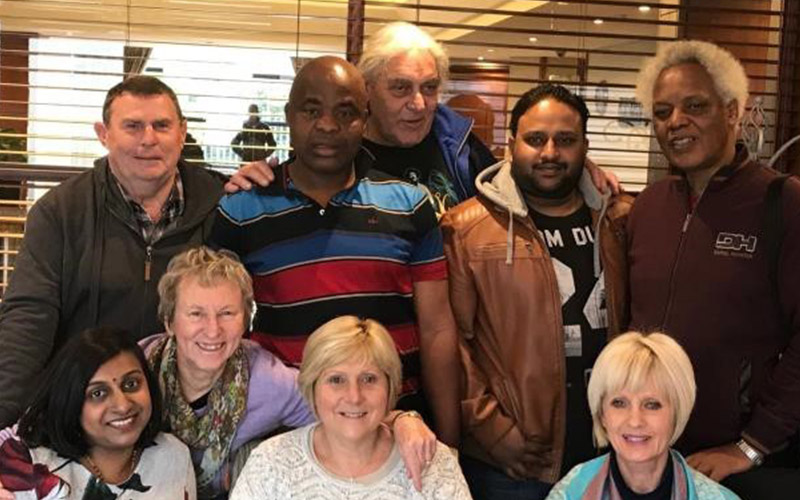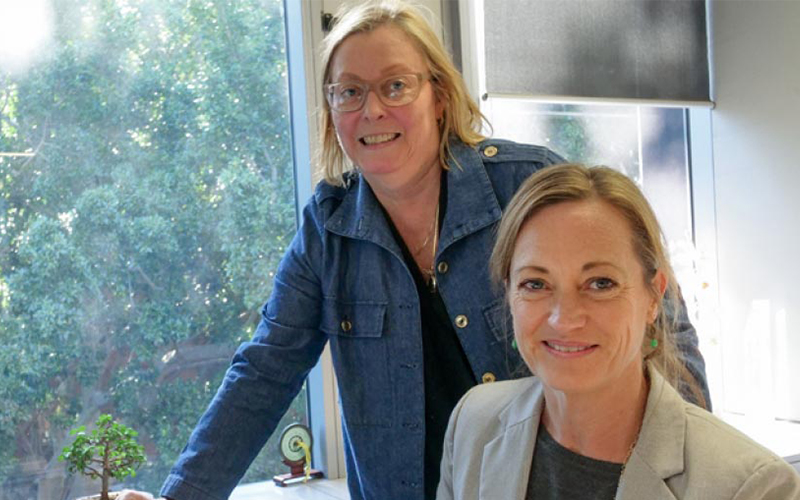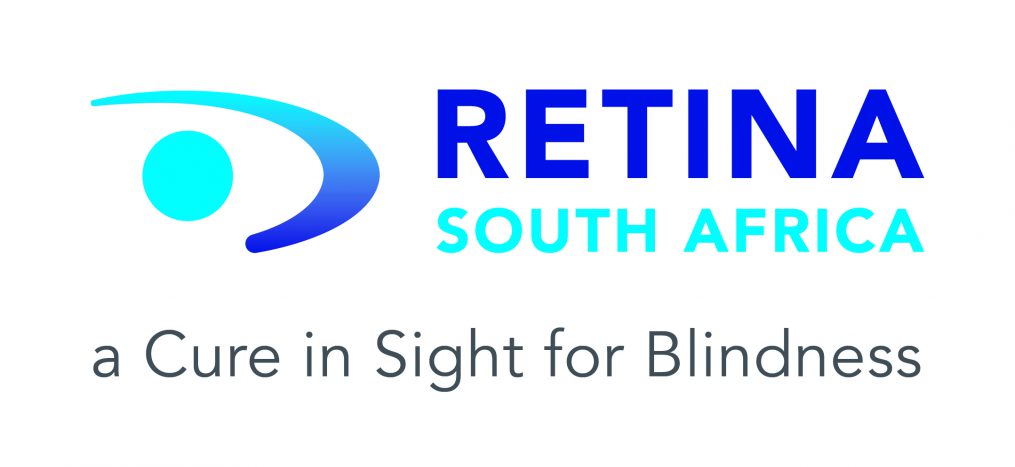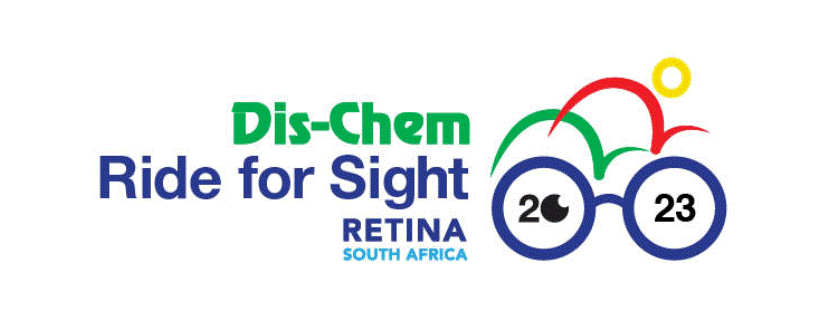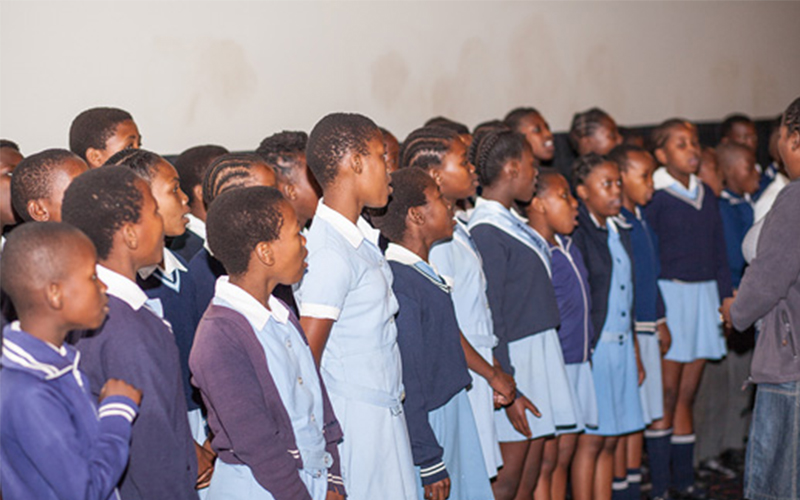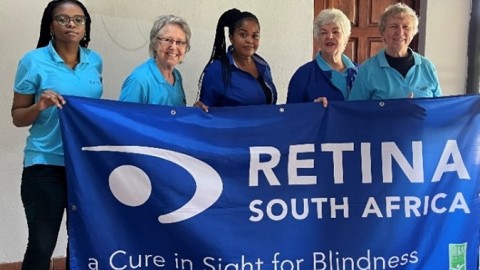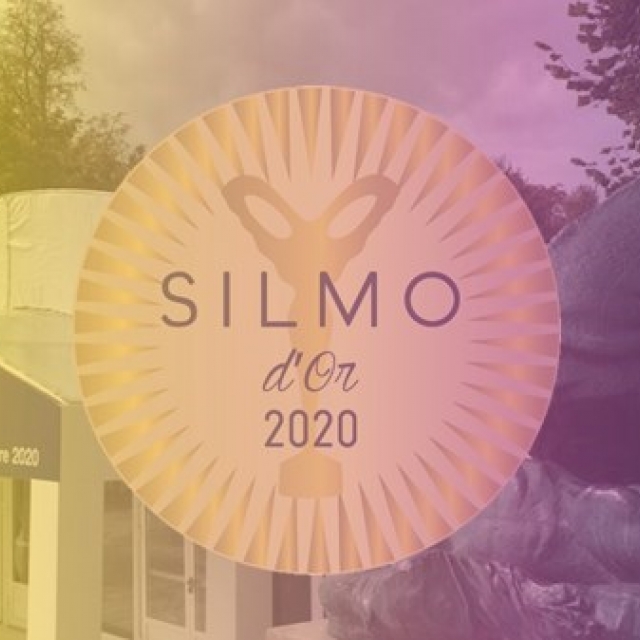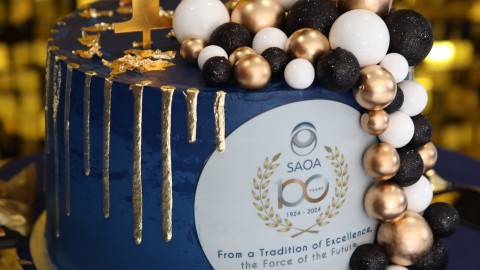World Retina Week- 24 to 30 September is the start of Eye Care Awareness month in South Africa. Retina South Africa is calling a CODE RED during this week to support the Screen for Life project to save both vision and lives.
We live in the midst of an unprecedented epidemic of diabetes. Unfortunately signs of the disease may not manifest until late in the disease process. Treatment at this stage is less effective and more expensive than earlier in the disease process.
People affected by complications often complain that they wish that they had known of their risk before the complications happened. This would have given them a chance to change their lifestyle on time to prevent further damage. Technology is available to predict risk of heart attack, stroke, kidney failure, amputation and blindness many years before these happen. This can be done by taking a photo of the retina. The eye is literally a window to health.
The Screen for life charter has been launched to provide a common unifying cause for a national screening program that will significantly reduce the impact of the diabetic epidemic on the South African population. It is supported by a coalition of screeners, providers of medical care, funders, corporates, NPO’s and people living with diabetes and their families. Retina South Africa is a proud signatory to the Charter. The founding statement for the charter is:
“We believe that nobody should lose life, limb or go blind without being afforded the opportunity of prior warning available by photo-screening.”
Anyone with Diabetes or elevated blood sugar levels should request a retinal fundus photograph from their Eye Specialist or screening Optometrists.
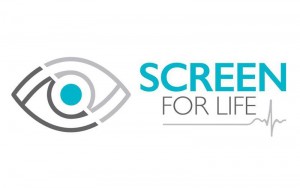
ADVERTISEMENT
Last year Orcam South Africa introduced it’s non-intrusive AI device called OrCam. OrCam assists partially sighted, low vision and blind patients to read any text, identify faces and products by just pressing a button or pointing a finger. OrCam is small and portable. Either the size of a cell phone or the new wireless version being the size of a finger.
Although Orcam has been available Internationally for many years it has only recently been introduced into South Africa. Orcam South Africa was also recently welcomed and joined forces to work with Retina South Africa and also became a member of the LIASA. Not only did Orcam join these powerful organizations, it is slowly moving in to the corporate world. We have recently put back to work an employee of Accenture and Absa and are now working with an employee of Total. We also had an opportunity of introducing ourselves to some of the universities and are working closely with Unisa and University of Limpopo at the moment and we will be at the HEDSA conference in the coming month of September. Orcam is also available at the Low vision Center, South African National council of the Blind and through reference from some Opthalmologist’s.
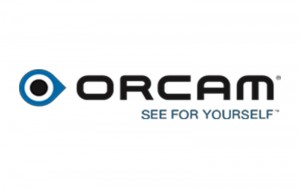
RESEARCH NEWS
AGE RELATED MACULAR DEGENERATION [AMD]
- The influence of diet and lifestyle has long been accepted as one of the most important influencing factors in Diabetes Type 2, and inevitably on vision loss from Diabetic Retinopathy. A recently published book by Dr Chris Knobbe has highlighted the links between lifestyle and diet on AMD. An Associate Professor of Clinical Ophthalmology, Dr Knobbe, shows the statistical links between the rise of modern processed foodstuffs and the alarming rise in the prevalence of AMD. AMD was a medical rarity before 1930 but now affects millions of people world wide. The rise of AMD is particularly alarming in the developed world and Dr Knobbe maintains that this is linked directly to a diet rich in processed, nutrient deficient foods, including sugar and Poly unsaturated vegetable oils. Genetics and other lifestyle risks are also contributory factors.
- Treatment with antidepressant medication may increase the anti-VEGF retreatment requirement in patients with AMD – Dr Mantel, University of Lausanne, Switzerland.Statiscal reserach suggests that individual treatment response to the AREDS formulation is largely determined by genetics. AMD patinets with high CFH and no ARMS2 risk alleles and taking the AREDS formulation had increased progression to Neo Vascularisation compared with placebo. Those with low CFH risk and high ARMS2 risk had decreased progression risk- Department of Ophthalmology, Massachusetts Eye and Ear Institute, Harvard Medical School, Boston.
- Researchers are using Artificial Intelligence and automated analysis of images and biomarkers to predict the progression of AMD in individual patients – Christian Doppler Laboratory for Ophthalmic Image Analysis, Department of Ophthalmology, Medical University of Vienna.
- A new anti- VEGF treatment for Wet AMD has shown great results in phase 3 clinical trials. The drug brolucizumab could reduce the frequency of injections from monthly to once every 3 months.
STEM CELL THERAPY
- The phase ½A study of progenitor cell therapy by Dr Henry Klassen has shown good safety data and statistically significant improvement in the treated eye compared to the untreated eye of 28 patients with Retinitis Pigmentosa [RP]. A phase 2b trial is underway.
- Dr Peter Coffey of Moorfields Eye Hospital, has developed an Embryonic Stem Cell [ESC] derived Retinal Epithelial [RPE] patch. The patch consist of a coated synthetic base membrane on which ESC cells, that have been differentiated into RPE cells are attached. Two patients with Wet AMD received the transplant. Patient 1 showed an increase in Visual Acuity of 29 letters and patient 2 of 21. Hopefully these good results will lead to a clinical trial.
GENE THERAPY
- Mutations in the PDE6B gene accounts for around 5% of recessive RP. A phase 1/2A trial to study the gene replacement has just begun in Nantes, France. Dr le Meur will study the safety and effectiveness of the HORA-PDE6B therapy in 12 patients.
- Achromotopsia CNGA3 clinical trial. The dose escalation study in 9 patients was conducted by Dr Fischer at the University of Tuebingen, Germany. The procedure was well tolerated and a consistant picture of improved cone function was observed which included visual acuity, contrast sensitivity and colour vision.
- X Linked Retinoschises- A phase 1/2A study involving nine patients with the RS1gene mutation, was conducted by Dr Paul Sieving from the NIH in the USA. Safety results were good and one patient showed some closure of the retinal cavities.
- Choroideremia – 15 Patients have been treated in the dose escalation trial by Dr Huckfeldt in Boston. No statistical improvements in vision were noted but this may be attributed to the late stage of the disease of the participants. An additional five patients with less advanced disease have now been treated and assessment is underway.
- Mutations in the CEP290 gene accounts for around 20% of Leber Congenital Amaurosis and also Joubert Syndrome. A clinical trial is underway at the University of Pennsylvania, Philadelphia, USA to evaluate a gene therapy in 8 patients. The mutation creates a splicing defect which effects both rods and cones.
- Getting the message right : In about 12% of Inherited Retinal Disorders [IRD] the translation of the genetic message for the production of the correct protein that the cells need to survive is prematurely stopped by the gene mutation. These mistakes are called premature termination codons [PTC’s]. It is as if someone is reading a sentence and stops halfway through- – the message does not make sense. A drug has been developed that can “read through” PTC’s. It has been tested in cellular and mouse models and various forms of drug delivery are now being tested. It has shown some effectiveness in other genetic conditions such as Duchene Muscular Dystrophy and Cystic Fibrosis. “We are excited about this drug as it holds potential to treat a wide range of retinal conditions including forms of RP and Usher Syndrome” said Dr Stephen Rose, chief research Officer of the Foundation Fighting Blindness, USA .
OPTOGENETICS
As photoreceptors degenerate in IRD the neural layer remains functional. The conversion of undamaged retinal ganglion cells [RGC] in this layer to make them light sensitive is a novel and exciting approach to the restoration of vision. Retrosense Therapeutics is conducting a small clinical trial to evaluate the safety of its optogenetic therapy – RST-01. Three patients with severe RP have been treated and some biological activity has been observed.
Dis-Chem Ride for Sight 2019
SAVE THE DATE: Sunday 17th February 2019
We need sponsors, prizes and a corporate team to man a water table at no charge. Please contact Linda at 011450 1181 if you can assist in any way.
NATIONAL NEWS
The Annual general meeting of Retina South Africa was held on Friday 17th
August in Edenvale. The following were elected to office: James Cape – National Chairman, Anton Van Rooyen- National Vice Chairman, Jean Bowler- National Treasurer, Claudette Medefindt- National Secretary.
The Foundation is in the process of moving towards a single unifying constitution which will give every member [ in good standing] an opportunity to participate fully in the organization, irrespective of the existence of a branch in their area. It will also make it possible for members to contribute to the Foundation in a small way within their own communities without the onerous requirements of starting a branch. The branch representatives to the NMC will oversee this conversion process.
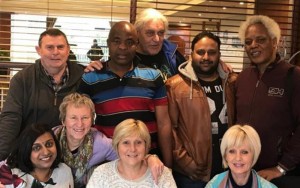
NMC: front, left: Shamiela Moodley, Claudette Medefindt, Jean Bowler, Gail Cillie. Back, left: James Cape, Makoko Makabulane, Anton Van Rooyen, Manny Moodley and Mkuseli Makathala.
USHER CONTACT GROUP
Sue has Usher Type 2 and is keen to communicate with other Usher patients,
Type 1, 2 or 3. Call or Whats app her on 0825930276 or email her: sue@dieticiansatwork.co.za.
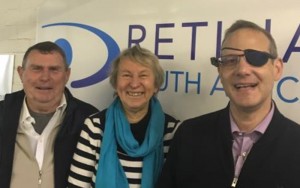
ORCAM AT RETINA SA
Munroe Swirsky visited Retina SA to show us the remarkable Orcam. This small discreet wearable device uses AI to recognize text, faces and objects. It also reads bar codes on products. He also demonstrated it at the Gauteng AGM in July. The device is amazing but expensive. A free alternative, which is much slower, is the SeeingAI App . At this stage only available on iPhone but coming to Android devices soon. INSTAGRAMER NEEDED Retina SA has a great Face Book administrator in Carlo Amorim but needs someone to start a RSA Instagram. Call us please!
FUND RAISING
FURY MOTORS RAFFLE
Some tickets for the Mazda Motor Car raffle are still available. But hurry. Call Linda at the national office 011450 1181.
CLINICAL TRIALS AND RESEARCH FUNDING
We need the help of every family affected by an inherited retinal disorder. Everyone can assist- even if in a modest way.
- Ask your employer to consider us as a recipient of a CSI donation. We will follow up with a proposal. Donations exceeding R250 are eligible, on request, for a Section 18a tax deduction.
- Nominate Retina South Africa as a beneficiary on My School/ My Planet at no charge to you whatsoever, www.myschool.co.za and remember to swipe your card.
- Join the Circle of Light – R250 per year to win a monthly draw prize.
- SMS the word Dream to 38267 to donate R10 to our research fund.
MEMBERSHIP FEES
When the new constitution is implemented only members in good standing will be eligible to nominate and vote for the National Committee. If you cannot afford the R200 per family membership fee, please apply for a fee waiver.
Banking details:
Retina South Africa,
Standard Bank,
Bedfordview branch code 018305,
Account number 020312164.
Please send us a copy of the eft so that we can track your payment. An extra donation to the RD research project will be welcomed.
NEED TO TALK?
For free advice, telephonic or individual counselling contact the national office at 0860595959 to make an appointment.
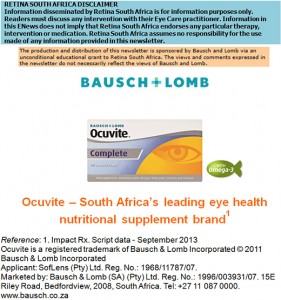
THANK YOU BAUSCH AND LOMB FOR YOUR CONTINUED SUPPORT OF OUR WORK.
